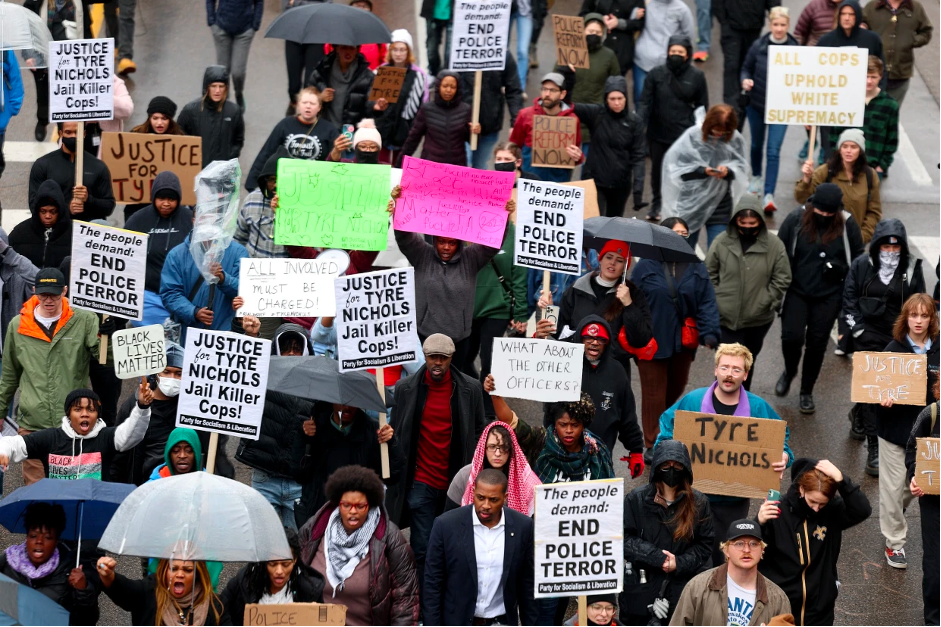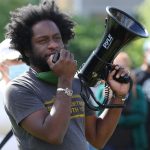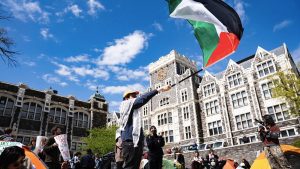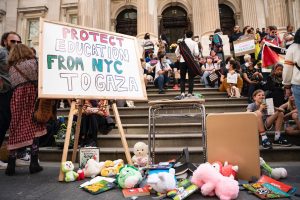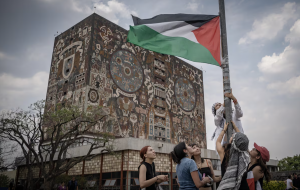The start of February is significant for two reasons. Not only is it the start of Black History Month, but it was the date that four Black college students staged the creative and dynamic tactic of a lunch counter sit-in in Greensboro, North Carolina that would spread like wildfire through the South as a form of resistance against Jim Crow. This struggle is part of the enduring spirit of Black people’s struggle for liberation that has been a continuous part of American history.
Today’s historical period is no different. While the struggle for Black liberation isn’t at the level we saw three years ago, a vanguard of Black workers and communities across the United States, awakened by the Black Lives Matter (BLM) uprising of 2020, continue to struggle against escalating attacks on Black lives. They are organizing both in their workplaces and their communities.
Black History Month this year came only a few days after video footage of the brutal and deadly assault of Tyre Nichols by five Memphis police officers. His death was the fourth high profile murder committed by the police in the last month, the three others being Black school teacher Keenan Anderson, anti-police and environmental activist Tortuguita, and Joe Fraser, Jr., who was shot and killed by Wyoming police while cleaning out his deceased grandmother’s apartment. While Joe Biden — who infamously said he wanted cops to just “shoot [people] in the leg” — and the Democrats try to portray themselves as staunch opponents of police brutality, they are in reality staunch supporters of it, as well as of massive police budgets and useless reforms that don’t address police brutality or systemic inequality.
The Republican Party offers no better alternative, and in fact has dedicated itself to eliminating even the right to teach Black studies, like Florida Governor Ron DeSantis — who is a leading figure inside the Republican Party and a potential presidential candidate — has recently done. Worse still, an important sector of the Republican Party has embraced a reactionary agenda of proto-fascist forces that are targeting oppressed communities like Black and Brown people, immigrants, women, and LGBTQ+ folks.
Both parties have presided over the growing inequality in the United States, an inequality that hits Black people the hardest. Black people have experienced higher death rates from Covid-19, 1.4 times the rate of white people. Other examples of this include the housing crisis, where in a majority Black city like Detroit, one out of five renters faced eviction even before the pandemic, and the end of a moratorium on water shutoffs means 60,000 residents are in danger of losing access to water. In Los Angeles County, Black people make up nearly eight percent of the residents there, but 34 percent of the houseless population. The Coalition for Homeless reported that homelessness in New York has reached its highest levels since the Great Depression, and Black people make up 57 percent of the heads of households in shelters. Black incarceration rates are five times that of white people: nationally, 1 in 81 Black adults is serving time in state prison.
The Bureau for Labor Statistics reported that in 2021, the unemployment rate for Black people was 8.6 percent, the highest percentage among all the categories of race and ethnicity. In comparison, white people made up 4.7 percent of the unemployed.
The Strategic Power of Black Labor
The Bureau for Labor Statistics data also shows something else: that among those employed, Black people made up the highest percentage who worked in the “production, transportation, and material moving” sector, the service sector, and sales. That proves that we are a critical sector of the working class, despite being overrepresented among the unemployed.
This fact is reflected in “Generation U” — that is, the young, multiracial, and multi-gendered workers who have been part of an important resurgence of union organizing. In fact, the organizing effort to unionize the Amazon fulfillment center in Bessemer, Alabama drew a direct connection between the struggle against police brutality and a struggle for workers rights.
It was also reflected in the workers’ struggles during the pandemic. Chris Smalls, the President and founding organizer of the Amazon Labor Union (ALU), began his struggle in Amazon during the pandemic against unsafe work conditions and the failure of Amazon to prioritize the lives of their workers over profits. We also saw over the last couple of years important labor struggles challenging the racist two tier system at Kellogg’s, John Deere, and at a 7 UP plant in Metro Detroit where the Teamsters union pointed out that a disproportionate number Black workers made up the second tier workforce.
Past revolutionaries, like General Baker, a Black, working-class revolutionary activist from Detroit, understood the strategic power of labor through the experiences of Black social revolt against oppression. During the uprising in Detroit in 1967 — an uprising caused by an incident of police brutality — General Baker observed that there were only two places Black people could go without being harassed: the hospital and the factories. This, and the study of Marxism, inspired him to organize the spirit of that uprising into the plants, which led to the creation of the Dodge Revolutionary Union Movement, which organized Black workers for better labor conditions and with the perspective of Black liberation.
Black Liberation through Socialist Revolution
One of the challenges we face in developing a strategic understanding of Black people’s social power is the way we experience exploitation and oppression. Black people are a race of people who are multi-class. While we are overrepresented among the working class, unemployed, and underemployed, other sectors of the community are middle- and upper-middle class, and some belong to the capitalist class. However, anti-Black racism means that even among these different classes, we are highly underrepresented, and face oppression for being Black. As just one example, Oprah Winfrey had the police called on her while shopping at a high end retail store in France by employees who were afraid that she was stealing because she was Black.
However, to eradicate the oppression we face requires more than token representation or Black capitalism. The Obama administration oversaw a massive housing crisis in which the president prioritized bailing out banks over helping the working class and even sectors of the middle class. He also oversaw an increased U.S. military presence across the globe, including in Africa, and oversaw the construction of draconian immigration laws that hit Haitian immigrants particularly hard.
This is the reality that Fred Hampton was grappling with when he said that “we’re not going to fight capitalism with Black capitalism, but we’re going to fight it with socialism.”
Since chattel slavery proved instrumental to capitalism’s development, capitalism has a vested interest in maintaining racist oppression. Anti-Black racism allows the capitalist to not only divide the working class, but extract even more profits from that division and exploit Black labor more deeply and cheaply. Therefore, the elimination of racism depends on the overthrow of capitalism.
Linking Exploitation and Oppression
An important development that took shape from the experience of the pandemic and the BLM uprisings of 2020 among the vanguard of these struggles was the linkage between exploitation and oppression.
Carmin Maffea, a Black revolutionary and writer for Left Voice, observed in their article “From BLM to Generation U: How the Spirit of the Uprising Persists in Today’s Labor Movement” that
Many of the union activists in the Starbucks unionization wave also come from the BLM movement, and see the fight against discrimination as the same as the fight for better working conditions. These harsh conditions impact a large workforce, half of which is made up of people of color. Due in part to the ideological and political influence of BLM, Starbucks workers like Casey say “You can’t be pro-LGBTQ, pro-Black Lives Matter, pro all these things and be anti-union.”
This connection was recently made by Chris Smalls. In a recent tweet, he said that the labor movement “has to take a stance when we’re talking community that is one without police!” He then goes on to make a powerful proposition: “Black History month should be a month of reflection on police brutality and the murders of Black people. Every year it’s another name we have to hashtag when will it end? When We decide to withhold our Labor! #StopCopCity”
These sentiments must not only be highlighted, but acted upon. To win our struggle against class exploitation and racist oppression, we have two key tasks ahead of us. First, we need a movement in the streets and our workplaces, with all of the social movement and labor organizations — including the ALU — putting their full power behind the issues they believe in and the demands of the movement. Second, we need to make a political break with the Democrats and Republicans, creating an independent party for the workers and oppressed based on anti-capitalist principles that condemn every manifestation of exploitation and oppression that capitalism creates both here and abroad.
A Time of Reflection and Generalization
The task of Black liberation and socialist revolution is an arduous one that requires a lot of discussions, debates, and deep reflections of our experiences and the history of class struggle. As a socialist publication composed of revolutionary socialists active in our unions, workplaces, and communities, we want to be part of the most important and dynamic conversations taking place on the Left and within the BLM and labor movements, among other struggles and movements taking place.
As part of that process, Left Voice wants to open our pages to Black students, workers, activists, intellectuals, and revolutionaries to submit visual art, short stories, journal entries, articles, essays, and poetry to showcase the voices that will one day greatly influence socialist revolution.
Email us at [email protected]


